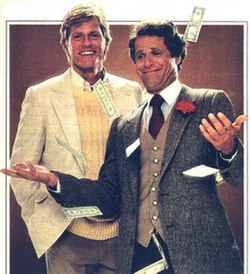Lottery!
| Lottery! | |
|---|---|
 |
|
| Genre | Drama |
| Created by | Rick Rosner |
| Written by | Hindi Brooks Don Bullock Tony DiMarco Rudy Doetherman David Engelbach David Gerber Peggy Goldman Bruce Kalish Stephen Kendal David Ketchum S.A. Long Lee Philips Duane Poole Ton Swale |
| Directed by |
Don Chaffey Barry Crane Georg Fenady Lawrence Levy Vincent McEveety Barbara Peters Lee Philips James Sheldon Mike Vejar Virgil W. Vogel Don Weis |
| Starring |
Ben Murphy Marshall Colt |
| Theme music composer | Elizabeth Bradley James P. Dunne |
| Opening theme | "Turn of the Cards" performed by Alan Graham |
| Composer(s) | Ken Heller Mark Snow Michael Melvoin |
| Country of origin | United States |
| Original language(s) | English |
| No. of seasons | 1 |
| No. of episodes | 17 (list of episodes) |
| Production | |
| Executive producer(s) | Rick Rosner |
| Producer(s) | Robert Janes Robert Lovenheim |
| Camera setup | Single-camera |
| Running time | 45–48 minutes |
| Production company(s) |
Rosner Television Orion Television |
| Distributor | MGM Television |
| Release | |
| Original network | ABC |
| Audio format | Monaural |
| Original release | September 9, 1983 – June 14, 1984 |
Lottery! is an American drama series that premiered on ABC on September 9, 1983. The series aired for one season of 17 episodes and starred Ben Murphy as Patrick Sean Flaherty, and Marshall Colt as Eric Rush. Lottery! centered on ordinary people who have won the lottery—all of a sudden becoming millionaires—and how it changes their lives.
Each week, several guest stars become instant millionaires (in two or three different stories) when their lottery tickets bring them fame, fortune, and usually trouble. Flaherty worked for the "Intersweep Lottery," which, as he told a winner in at least one episode, was sponsored by the "Intersweep Bank." (In at least one other episode, one winner noted that the lottery was the Intersweep Lottery division of "Inter-European Bank," which could be presumed to be the American arm of "Inter-European Financial Services.") His job was to find the winner(s), inform them of their winnings, and give him or her an envelope containing $5,000 in cash, and a check worth millions. In the event of ownership disputes with the winning ticket, Flaherty would also act as an arbitrator responsible for determining the true recipient in what method used to settle the matter.
Rush was Flaherty's partner, an IRS agent who oversaw the accounting of the payouts and the arrangement of the winner's tax obligations. Each episode also took place in a different city around the country. (Presumably, Inter-European Financial Services was a multi-national conglomerate, and Flaherty and Rush most likely had counterparts in other countries.)
The opening titles for the show featured large banks of computers and tape drives. Above what appeared to be a trading floor (similar to what one would see at a stock exchange) were large electronic toteboards showing the latest prizes, the winners's names, and the countries in which they lived. This flurry of activity, however, was never a part of any of the show's episodes, and Flaherty and Rush themselves were never at the Inter-European/Intersweep offices for any of the plot lines. At the end of every episode, the show displayed the following disclaimer:
"The Intersweep Lottery is purely fictitious.
Except for states where they are legally authorized, lotteries in this country are illegal."
The Intersweep Lottery itself was actually more akin to the Publishers Clearing House than any of the popular lottery games in the U.S. and around the world, such as the Irish Sweepstakes, which was believed to have given Rosner the idea for the series. (That both actor Ben Murphy and his character, Patrick Flaherty, were of Irish extraction, and that Murphy was sometimes shown wearing a Bowler brand derby hat, seemed to support this.) Rather than having a drawing consisting of individually numbered ping-pong balls selected by randomly ordered machines, participants in this lottery purchased numbered tickets. (The cost per ticket was not stated in the series. However, since the lottery itself was described as having a bank sponsoring it, depositors apparently received a specific number of such tickets upon opening new accounts or obtaining additional services on existing accounts.) Each ticket carried a unique serial number consisting of two letters followed by six numbers (example: AG 482 979). The drawing of winning numbers was also never featured in any of the episodes in this series.
...
Wikipedia
